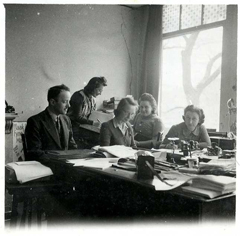
Prinsengracht 263, May 1941, with (from left to right) Victor Kugler, Bep Voskuijl Miep Gies & 2 staff members
During the period that the families Frank and Van Pels were in hiding, Victor Kugler and Johannes Kleiman ran Otto Frank's company. Otto Frank advised them from the Secret Annex, and in that way Mr. van Pels also remained involved with the business. When the eight hiders were finally arrested and taken away on August 4, 1944, along with their two helpers Kugler and Kleiman, Miep Gies was the only person that could keep the business running. She and Bep Voskuijl had not been arrested, and the office had not been cleared out by the Germans. They had also left the spice mills in the basement. Miep obtained permission from the bank to pay the salaries of personnel and bills from suppliers with her signature. ‘So in spite of the worst having come to pass, life went on at the Prinsengracht; orders for spices for sausage and pectin for jammaking kept coming, and we continued to fill them.'
Toward the end of September 1944, Johannes Kleiman suddenly returned. He had been released from the German prisoners' camp on account of his poor health. He immediately resumed the daily management of the company. The work simply carried on as usual. All that time, Anne Frank's diaries lay in Miep's desk drawer. After Mr. Kleiman's return, Miep and he walked to the office and home again together, every day. They no longer had bicycles and the days felt gray and desolate. Although the Germans were clearly losing the war, the hunger winter was yet to come. 'All conversations centered on food. Food obsessions were affecting all our minds. (...) Each day was just another day on the Prinsengracht, the long walk back to our River Quarter punctuated by feelings of faintness and waves of nausea, Jo Koophuis beside me. Always Jan and our cat waiting for me at home, or I for them. How to stretch two potatoes into a meal for two grown people and one cat?’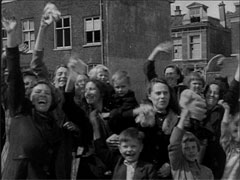
Exuberant joy among the people on the day of liberation. Source: website nostalgienet.nlIn the spring of 1945, the long-awaited liberation finally came. People celebrated for days on end, people in hiding came out of hiding, and soon the refugees and Jews that had survived the horrors of the concentration camps returned to Amsterdam. Victor Kugler had survived the war and returned to the office. Jan Gies ran an aid center to assist those returning, and he asked everyone whether they knew the Frank family and what had happened to them, but to no avail. Finally, on June 3, 1945, he received a definitive answer: someone told him that Otto Frank was on his way back to Amsterdam. That same day Mr. Frank rang the bell of Jan and Miep's home. ‘We looked at each other. There were no words. He was thin, but he’d always been thin. He carried a little bundle. My eyes swam. My heart melted. Suddenly, I was afraid to know more. I didn’t want to know what had happened. I knew I would not ask.’ Click here to see a video excerpt in which Miep recounts seeing Otto Frank again.
Otto Frank was still standing in front of their door when he said: 'Miep, I have come to you because, of all the people that are left, you and Jan are dearest to me.' He told them that his wife Edith would not be returning, ‘But I have great hope for Margot and Anne.' Otto Frank continued to stay with Miep and Jan, and he and Miep went to the office every day. Johannes Kleiman continued to work as company director. It was at the office on Prinsengracht that Otto Frank read the letter informing him that Anne and Margot would also not be returning. He told Miep, who then opened her desk drawer and pulled out the packet of papers that Anne had written. No-one, not even Miep, had read them or even touched them. Now that she knew she could not return the papers to Anne, she gave them to Anne's father with the words, 'This is the legacy of your daughter Anne'. Otto Frank read the diary and after work, in the evening hours, he translated excerpts into German for his mother, living in Basel, Switzerland. Time and again he asked Miep to listen when wanted to read something out loud, but each time Miep refused. She was afraid for what she might hear and could not bring herself to listen to Anne's stories, read out by her father. 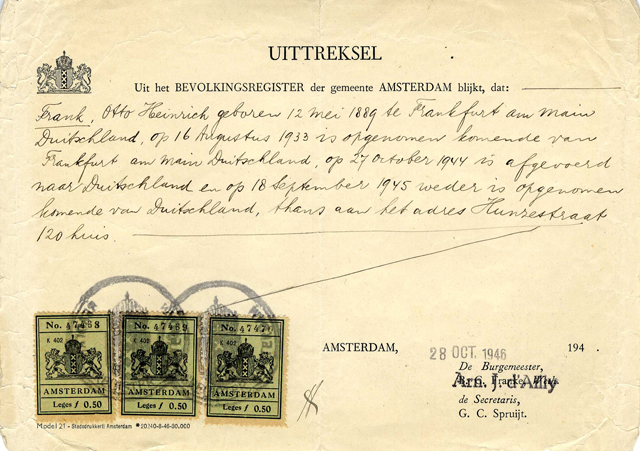
Proof that Otto Frank had returned to the Netherlands from Auschwitz and was staying with Miep and Jan Gies, first in Hunzestraat and later in JekerstraatAfter some time, Jan, Miep and Otto left the rooms that they rented from Mrs. Stoppelman in Hunzestraat, moving in with Jan's sister Fenna who lived just a bit further up the street. ‘All of us were weak, depleted, slow-blooded. I had no reserve of energy anymore, but fortunately, I no longer needed great strength and energy. None of us was much for conversation, but our common memories kept us bonded together.' Otto Frank had asked Miep to start calling him Otto instead of Mr. Frank, but she only did so at home, at the office it continued to be Mr. Frank.
Across the country, efforts to rebuild were gradually getting underway, shattered buildings and infrastructure were renewed, and the shops slowly started carrying products again. Before they went into hiding, Otto and Edith Frank had stored a large part of their antique furniture and other possessions with friends. These could now be taken back and Otto Frank gave everything to Miep and Jan. ‘Edith would have been happy to know that you are using these things.' When two new bicycles arrived from England for Otto Frank, one was for himself and the other was for Miep. She was happy to accept the gift, as she had never had a new bicycle before.
Although the five-year German occupation had ended and rebuilding efforts had gotten underway, daily life remained a struggle. Shops remained empty, there was a serious shortage of housing, and the world in general was divided into 'right' and 'wrong', especially by the Dutch. In early 1947 Miep, Jan and Otto moved again, now to Jekerstraat 65, where they moved in with a friend of Jan's who had recently become a widower. Although Otto Frank had many friends and contacts and could also have started living or staying elsewhere, he preferred to stay with Jan and Miep. 'I prefer staying with you, Miep, he explained. That way I can talk to you about my family if I want.'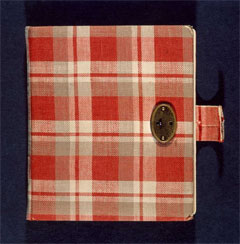
Diary of Anne Frank. Source: website entoen.nuEvery Sunday he had a group of Jewish friends over for coffee, who had also lost most of their family in the concentration camps. Otto Frank told these people about Anne's diary, and one of them asked if he might read it. Frank hesitated for a long time, but finally he showed him some of the excerpts that he had translated for his mother. This person was so touched by what he read that he asked if he might not read everything. With some reluctance, Frank agreed. The man then asked if he could lend the diary to the historian Jan Romein to read, a good friend of his. Again Otto Frank hesitated, but was finally persuaded. Jan Romein was also much impressed by the diary, and he wrote an article about it for the daily newspaper Het Parool. He also asked Otto Frank to consider having the diary published. Their arguments as to the historic significance of Anne's diary ultimately outweighed the violation of Anne's privacy, which would be the inevitable result of publication. With great reluctance, Otto Frank agreed to the publication by the Contact publishing house in Amsterdam. That first tentative publication was the first of many, and it is currently estimated that some 25 million people around the world have read the diary. Yet when the first print appeared in 1947, neither Miep nor Jan wanted to read it. ‘Always Otto would tell me, “Miep, you must read it.” But always I couldn’t. I couldn’t relive the miseries, and I wouldn’t rekindle the terrible losses.'
Shortly after the first edition, a second edition was printed in that same year and after that had sold out, a third edition was prepared. Miep finally let herself by persuaded by Otto, and on a summer's day in 1947 she took the second edition of the diary to her room, closed the door behind her, and started to read. ‘I read the whole diray without stopping. From the first word, I heard Anne’s voice come back to speak to me from where she had gone. I lost track of time. Anne’s voice tumbled out of the book, so full of life, moods, curiosity, feelings. She was no longer gone and destroyed. She was alive again in my mind.'
After the diary's publication, Otto Frank acquired a full day's work in terms of all the associated tasks, and he gradually started working less and less for the company. Miep also resigned, in the summer of 1947. She was now living with three men in the house, so that running the household became something of a full-time job that cost a lot of energy. In 1948, Princess Juliana succeeded her mother as Queen of the Netherlands, and Jan Gies won a prize in a lottery. They spent the money on a holiday to Switzerland, and Otto Frank came along. He would be seeing his mother again, who lived in Basel, for the first time since the war. In 1949, the now forty-year old Miep turned out to be pregnant, and their son Paul was born on July 13, 1950. Life had returned to normal, there were plenty of groceries available, and everything was once again in working order. 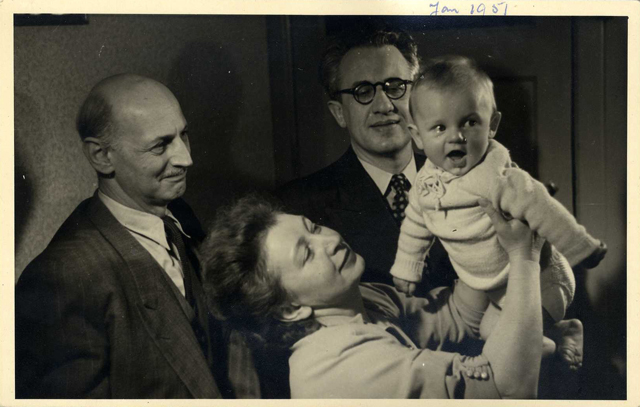
Miep Gies with son Paul, Otto Frank and Jan, January 1951, in Amsterdam
After having lived with Miep and Jan for seven years, in the fall of 1952 Otto Frank emigrated to Switzerland, in order to be close to his mother. In November 1953 he remarried, with a woman who had also lost most of her loved ones in the concentration camps. Until his death in 1980, Otto Frank telephoned Jan and Miep every year on their wedding day on July 16. They also regularly visited him in Switzerland. 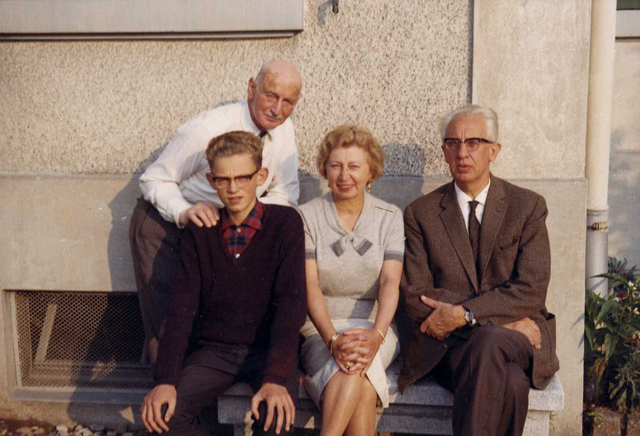
The Gies family visiting Otto Frank in Basel (Switzerland), summer of 1964
All quotes in this chapter are taken from the book Anne Frank Remembered. The Story of the Woman Who Helped to Hide the Frank Family. By Miep Gies with Alison Gold. Simon and Schuster, New York 1987.
A new edition of the book is expected for early 2009.


